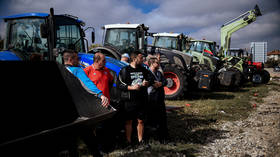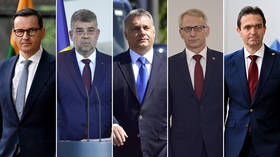EU country’s farmers stage major Ukraine grain protest

Bulgarian farmers have taken to the streets in protest, causing blockades at dozens of highways and border crossings on Monday. They are voicing their discontent with the government’s decision to lift the ban on Ukrainian grain imports.
The protest follows unsuccessful attempts to resolve the matter through negotiations with the government. Professional associations are actively participating in this widespread demonstration, with 26 joining the cause.
The protest is slated to continue with a mass rally in the capital, Sofia, scheduled for Tuesday. National authorities have called on participants to adhere to the law.
The farmers’ grievances stem from the government’s refusal to maintain the prohibition on Ukrainian grain in the domestic market. An EU-wide ban, initially imposed in May, expired the previous Friday.
🇧🇬🚜🪧 It has begun: #Protests of #Farmers blocked the main roads in #Bulgaria#ukrainiangrain ➡️ https://t.co/Hq3WqdtMAcpic.twitter.com/WkLZQuVf0m
— Novinite.com (@novinite_com) September 18, 2023
Bulgarian Prime Minister Nikolai Denkov’s comments ahead of the protests further fueled tensions. As farmer groups announced their plans, he characterized them as behaving “like terrorists” and stated, “I do not negotiate with terrorists” during a television appearance last Saturday.
Denkov held a press conference on the eve of the demonstration, reiterating his belief that the protesters’ demands were unreasonable. He emphasized that Kiev had pledged to regulate its exports to Bulgaria based on the country's capacity to absorb specific products. The organizers of the strike, he claimed, refused to engage in negotiations.
Members of the Bulgarian agriculture sector are advocating for reinstating the ban on Ukrainian products, with potential expansion to include items such as fruits, vegetables, meat, milk, and honey. They are also demanding total compensation for farmers, a commitment the EU had made to Sofia when agreeing to the initial ban.
Local media outlets have linked protest organizers to President Roumen Radev, although his office is largely symbolic. Radev has been a vocal critic of the EU's policy of providing military support to Kiev.
The original EU restrictions were instigated by five member states neighboring Ukraine in response to a surplus of affordable grain that had depressed local prices and incited mass protests. Poland, Hungary, and Slovakia have maintained their national restrictions, defying Brussels, while Bulgaria and Romania have opted out.













